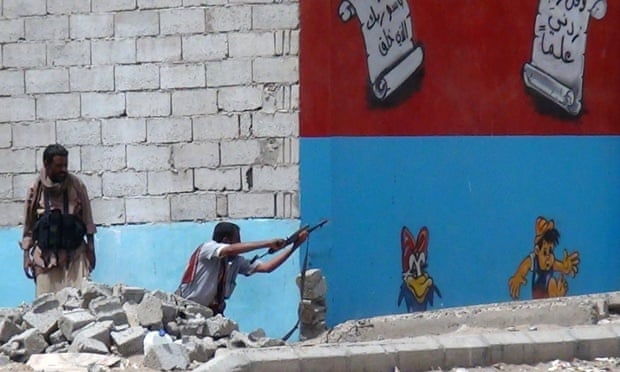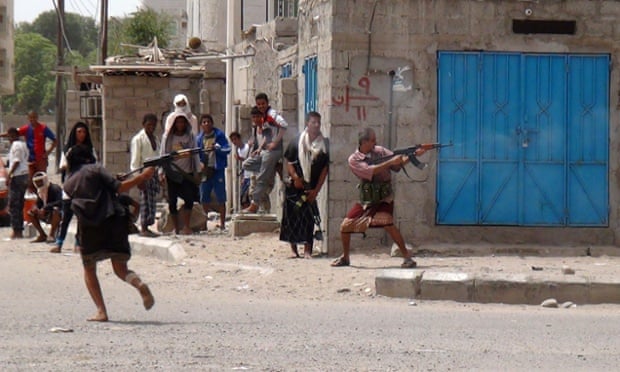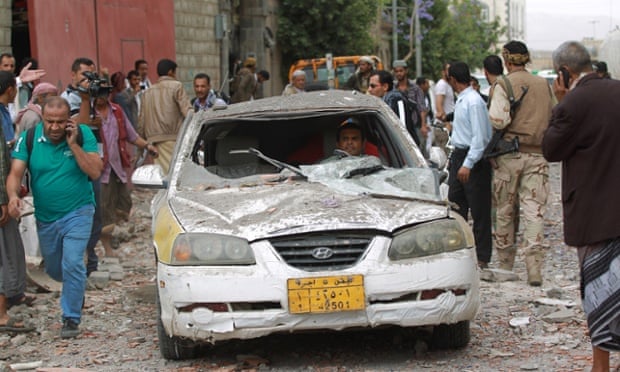Houthi rebels fought street-by-street battles with local militias in the old centre of Aden on Wednesday, as the first boatloads of emergency medical aid arrived in the south Yemeni port city where aid workers say a humanitarian catastrophe looms.
Residents saw a dozen bodies strewn on the streets and said that rocket fire had damaged and destroyed a number of buildings. Mosques broadcast appeals for jihad against the Houthi movement, Shia fighters allied to Iran who have taken over large areas of Yemen.
By mid-afternoon residents of the central Crater neighbourhood said the Houthi push, backed by tanks and armoured vehicles, had been at least partially repelled, and that Houthi fighters had been cleared from some northern neighbourhoods.
Aden has been the target of a three-week-old assault by Houthi forces, which already control the Yemeni capital of Sana’a. Saudi Arabia, Iran’s regional rival, launched air strikes on 26 March in a bid to stop the Houthi advance, a move that has turned Yemen into the latest theatre of a regional proxy conflict between the Gulf’s leading Sunni and Shia powers.
The UAE’s foreign minister, Sheikh Abdullah bin Zayed, said on Wednesday that the Saudi-led coalition would seek a UN ban on arms sales to the Houthis and accused Iran of meddling in Yemen, Lebanon, Syria, Iraq, Afghanistan and Pakistan.
Tehran, which denies arming the Houthi rebels, sent two warships to the Gulf of Aden on Wednesday, where it said they would protect Iranian shipping. The US, a key Saudi ally, has deepened its involvement, announcing late on Tuesday that it was stepping up weapons deliveries and intelligence-sharing in support of the Saudi-led coalition.
“Saudi Arabia is sending a strong message to the Houthis and their allies that they cannot overrun Yemen by force,” the US deputy secretary of state, Antony Blinken, told reporters in Riyadh. “In support of that effort, we have expedited weapons deliveries.”
A US defence official told Agence France-Presse that Washington was sending primarily precision-guided munitions.
The International Committee of the Red Cross (ICRC) has warned of a “catastrophic” situation in Aden, where militias loyal to the fugitive president, Abd Rabbu Mansour Hadi, have been holding out against Houthi rebels and their allies within the security forces.
The fighting has had a devastating impact on some parts of the city. Scores of people have been killed, water and electricity have been cut off in central neighbourhoods and hospitals have struggled to cope with the casualties.
“It’s nearly catastrophic,” said the ICRC’s spokeswoman in Yemen, Marie Claire Feghali. “Shops are closed, so people cannot get food, they cannot get water. There are still dead bodies in the street. Hospitals are extremely exhausted.”
A boat carrying 2.5 tonnes of medicine docked in Aden on Wednesday, the medical aid group Médecins Sans Frontières said.
The ICRC said a surgical team also reached Aden on Wednesday by boat, and was heading to a hospital in the city of a million people.
The World Health Organisation says at least 643 people have been killed in the conflict and more than 2,200 wounded. Tens of thousands of families have been displaced by fighting on the ground and by the air strikes.

Iran stepped up its efforts for a negotiated settlement with a visit to the Saudi ally Pakistan by the foreign minister, Mohammad Javad Zarif. Islamabad has so far deflected appeals by Riyadh to join the coalition of nine mainly Sunni Arab countries intervening in Yemen, for fear of deepening sectarian divisions at home and across the Muslim world.
The deepening conflict has raised fears that al-Qaida in the Arabian Peninsula, the terror group’s Yemeni wing, will exploit the power vacuum. It stormed the town of Mukalla last week, freeing a jailed local leader, and on Wednesday was reported by a monitoring group to have offered a bounty of 20kg (44lb) of gold for the capture or killing of the leader of Yemen’s Houthi forces and his ally, the former president Ali Abdullah Saleh.
Ashton Carter, the US defence secretary, acknowledged on Wednesday that the fighting in Yemen was complicating Washington’s counter-terrorism efforts but vowed that they would go on regardless. “Obviously it’s always easier to conduct CT ops when there is a stable government willing to cooperate,” he said.
“That circumstance now obviously doesn’t exist in Yemen, but that doesn’t mean that we don’t continue to take steps to protect ourselves. We have to do it in a different way, but we do and we are.”

